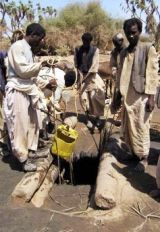Sudan unsure of eastern rebels unity – FM
Dec 7, 2005 (ASMARA) — Sudanese Foreign Minister Lam Akol on Wednesday questioned the unity within a newly-forged rebel alliance which is active east Sudan and is due to open talks with Khartoum.

|
|
Beja people collect water in the rebel-controlled area of eastern Sudan, near the border with Eritrea June 4, 2005. The Beja people live a virtually medieval existence among desert plains and stony mountains in remote and rebel-controlled eastern Sudan. Lack of development in their region is one of the main grievances that spur the Beja rebels who have controlled this small area on the Eritrean border since early 1997. (Reuters). |
Speaking to reporters during a visit to Asmara to cement a rapprochement between Eritrea and Sudan after years of strained ties, Akol said Khartoum was unsure the Eastern Front was able to speak as one.
“I don’t know whether they are one body or not,” he said. “You want to know who you are talking with.”
Talks between Khartoum and the Eastern Front, which comprises eastern Sudan’s two main rebel groups, the Beja Congress and the Free Lions, had been due to start in Libya in November but were then pushed back to this month.
The December date for the talks has now been scrapped although an Eastern Front official told AFP the group had now proposed January for its first-ever negotiations with the government.
Akol did not comment on the proposed date for the talks but downplayed the chances of them resulting in a peace deal to end more than a decade of sporadic fighting in eastern Sudan.
“It will be an exploration of whether the other side is ready to negotiate,” he said.
Like their better-known rebel counterparts in Sudan’s troubled western Darfur region the Eastern Front complains of marginalization by the government in Khartoum.
The front was founded by the Beja Congress and the Free Lions earlier this year and claimed to have launched its first combined offensive against Sudanese government positions in Red Sea state in June.
The extent of that fighting remains unclear although it raised fears that conflict in the east could hurt peace efforts in the western Darfur region as well as jeopardize a January peace pact that ended Sudan’s long-running north-south civil war.
The hostilities also significantly heightened tensions between Sudan and Eritrea, where the Eastern Front keeps offices, and prompted an urgent UN mediation mission to cool rising antagonism between Asmara and Khartoum.
In October, Eritrea and Sudan announced an end to “more than 10 years of estrangement,” and this led to a series of high-level visits by senior officials from both sides, the latest of which is Akol’s trip.
“We are fairly optimistic that we’ll lay the ground for a better relationship between the two countries,” he said of his visit to Asmara.
Last week, senior officials from Khartoum and Asmara said they were hopeful Akol’s talks could set the stage for the re-opening of their common border that was closed in October 2002.
(AFP/ST)
